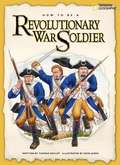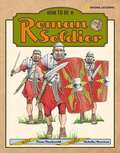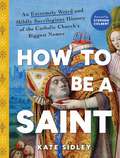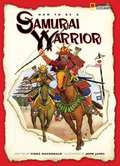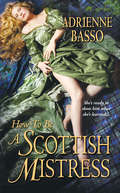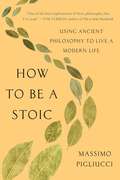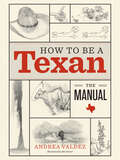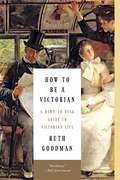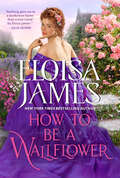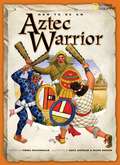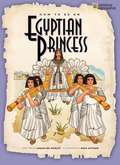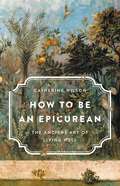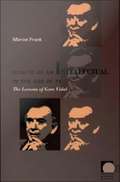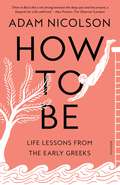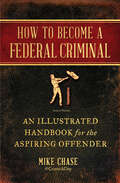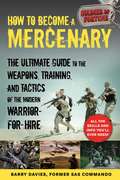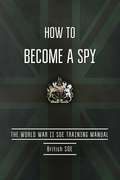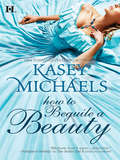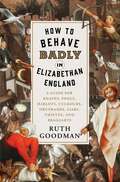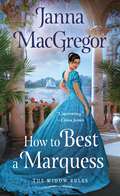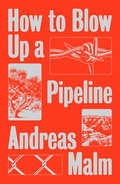- Table View
- List View
How to Be a Revolutionary War Soldier
by Thomas RatliffThese are tense times between Britain and her American colonies. In Boston, tea has been dumped in the harbor and revolution is brewing in the streets. Militias are drilling in town squares and all around you can hear the call of freedom. But how will you be trained? How will you be paid? How will weapons be supplied? And uniforms? What if you are wounded? This abundantly illustrated book will prime you for the interview that will determine your fate-and the war that will forge America’s future. Prepare to answer the call!
How to Be a Roman Soldier
by Fiona Macdonald Nicholas J. HewetsonSoldiers Needed! How would you like to join the Roman army?Your main duties will include: - defending the city of Rome, its empire, and its frontiers from enemy attack- marching to put down rebellions in conquered lands- digging ramparts and ditches, building forts, and constructing roads- obeying orders and fighting bravely as part of a team. Apply to the army headquarters in your provincial capital for a medical checkup and an interview.
How to Be a Saint: An Extremely Weird and Mildly Sacrilegious History of The Catholic Church's Biggest Names
by Kate SidleyPart history lesson. Part sacrilege. An entirely good time.Think you have what it takes to be a saint? Lucky for you, thousands of souls have paved the way to heaven—creating a clear formula for getting the job done while also leaving a rich, disturbing history behind them. And in just five easy-ish steps, you can learn how to secure your own halo!But even if the whole "dying and becoming a saint" thing doesn't appeal to you, the bizarrely bureaucratic process of canonization is still guaranteed to delight and entertain. How to Be Saint is a compulsively readable and endlessly entertaining ride through Catholicism for anyone who enjoys their history with a side of comedy. From flying friars to severed heads, this book explores the wild lives (and deaths) of saints and pulls the curtain back on the oddest quirks of religious doctrine.Whether you're a lifelong Catholic or a weird-history enthusiast, How to Be a Saint is your ultimate guide to understanding the hilarious, fascinating, and shockingly true history of sainthood.
How to Be a Samurai Warrior
by Fiona Macdonald John JamesCan you handle a horse? Are you skillful with a bow? Are you brave in the face of danger? Will you wear this smelly, lice-infested armor with dignity? Have you truly earned the respect and honor shown to the samurai? Are you of honorable lineage? Will you show absolute loyalty to your lord? Do you understand that dishonor will bring death-by that same sword that you must sleep beside every night of your life? Are you ready to rise in rank?
How to Be a Scottish Mistress
by Adrienne BassoA medieval Scottish earl schools a British widow in the art of seduction in this romance by the bestselling author of Every Bit a Rogue.She&’s his in every way . . . When newly widowed Lady Fiona Libourg flees to Scotland in need of protection, Lord Gavin McLendon is powerless to refuse the British beauty. Especially when she offers herself in exchange. Now the brooding Scottish warrior can think of nothing else but ravishing his delectable new mistress, even though he&’s dutybound to marry another . . .But one . . . Fiona is shocked when Gavin accepts her scandalous offer—and fretful at the thought that he will discover how little she knows of seduction. But when Gavin proves to be a skilled and achingly sensuous teacher, Fiona doesn't want their passionate arrangement to end. Now she can't help but wonder just what it would take to go from Scottish mistress . . . to Scottish wife.Praise for How to Be a Scottish Mistress &“[A] heartwarming odd-couple romance . . . . A sweet, delightful progression from attraction to all-encompassing love.&” —Publishers Weekly &“An entertaining and deeply emotional story that will hook readers with its refreshing plot and hold them to the very end with her fascinating details and engaging characters.&” —The Romance Reviews
How to Be a Stoic: Using Ancient Philosophy to Live a Modern Life
by Massimo PigliucciAn engaging guide to how Stoicism--the ancient philosophy of Epictetus and Marcus Aurelius--can provide lessons for living in the modern worldWhenever we worry about what to eat, how to love, or simply how to be happy, we are worrying about how to lead a good life. No goal is more elusive. In How to Be a Stoic, philosopher Massimo Pigliucci offers Stoicism, the ancient philosophy that inspired the great emperor Marcus Aurelius, as the best way to attain it. Stoicism is a pragmatic philosophy that teaches us to act depending on what is within our control and separate things worth getting upset about from those that are not. By understanding Stoicism, we can learn to answer crucial questions: Should we get married or divorced? How should we bank in a world nearly destroyed by a financial crisis? How can we survive great personal tragedy? Whoever you are, Stoicism has something for you-and How to Be a Stoic is your essential guide.
How to Be a Texan: The Manual
by Andrea ValdezThere are certain things every Texan should know how to do and say, whether your Lone Star roots reach all the way back to the 1836 Republic or you were just transplanted here yesterday. Some of these may be second nature to you, but others . . . well, maybe it wouldn’t hurt to have a few handy hints if, say, branding the herd or hosting a tamalada aren’t your usual pastimes. That’s where How to Be a Texan can help. In a friendly, lighthearted style, Andrea Valdez offers illustrated, easy-to-follow steps for dozens of authentic Texas activities and sayings. In no time, you’ll be talking like a Texan and dressing the part; hunting, fishing, and ranching; cooking your favorite Texas dishes; and dancing cumbia and two-step. You’ll learn how to take a proper bluebonnet photo and build a Día de los Muertos altar, and you’ll have a bucket list of all the places Texans should visit in their lifetime. Not only will you know how to do all these things, you’ll finish the book with a whole new appreciation for what it means to be a Texan and even more pride in saying “I’m from Texas” anywhere you wander in the world.
How to Be a Texan: The Manual
by Andrea ValdezFrom two-stepping to tamaladas, &“a must-read manual for anyone looking to learn more about the wild and wonderful state&” (Texas Monthly) There are certain things every Texan should know how to do and say, whether your Lone Star roots reach all the way back to the 1836 Republic or you were just transplanted yesterday. Some of these may be second nature to you, but others…well, maybe it wouldn&’t hurt to have a few handy hints if, say, branding the herd or hosting a tamalada aren&’t your usual pastimes. That&’s where How to Be a Texan can help. In a lighthearted style, Andrea Valdez offers illustrated, easy-to-follow steps for dozens of authentic Texas activities and sayings. In no time, you&’ll be talking like a Texan and dressing the part; hunting, fishing, and ranching; cooking your favorite Texas dishes; and dancing cumbia and two-step. You&’ll learn how to take a proper bluebonnet photo and build a Día de los Muertos altar, and you&’ll have a bucket list of all the places Texans should visit in their lifetime. Not only will you know how to do all these things, you&’ll finish the book with a whole new appreciation for what it means to be a Texan.
How to Be a Victorian: A Dawn-to-Dusk Guide to Victorian Life
by Ruth GoodmanA delightful tour through the intimate details of life in Victorian England, told by a historian who has cheerfully endured them all. Ruth Goodman believes in getting her hands dirty. Drawing on her own adventures living in re-created Victorian conditions, Goodman serves as our bustling and fanciful guide to nineteenth-century life. Proceeding from daybreak to bedtime, this charming, illustrative work celebrates the ordinary lives of the most perennially fascinating era of British history. From waking up to the rapping of a "knocker-upper man" on the window pane to lacing into a corset after a round of calisthenics, from slipping opium to the little ones to finally retiring to the bedroom for the ideal combination of "love, consideration, control and pleasure," the weird, wonderful, and somewhat gruesome intricacies of Victorian life are vividly rendered here. How to Be a Victorian is an enchanting manual for the insatiably curious.
How to Be a Wallflower: A Would-Be Wallflowers Novel (Would-Be Wallflowers)
by Eloisa JamesFrom New York Times bestseller Eloisa James, a new Regency-set novel in which a heiress with the goal of being a wallflower engages a rugged American in a scorchingly sensual, witty wager that tests whether clothing does indeed make the man—or the wallflower! A perfect companion story to Eloisa's My American Duchess.Miss Cleopatra Lewis is about to be launched in society by her aristocratic grandfather. But since she has no intention of marrying, she visits a costume emporium specifically to order unflattering dresses guaranteed to put off any prospective suitors.Powerful and charismatic Jacob Astor Addison is in London, acquiring businesses to add to his theatrical holdings in America—as well as buying an emerald for a young lady back in Boston. He’s furious when a she-devil masquerading as an English lady steals Quimby’s Costume Emporium from under his nose.Jake strikes a devil’s bargain, offering to design her “wallflower wardrobe” and giving Cleo the chance to design his. Cleo can’t resist the fun of clothing the rough-hewn American in feathers and flowers. And somehow in the middle of their lively competition, Jake becomes her closest friend.It isn’t until Cleo becomes the toast of all society that Jake realizes she’s stolen his fiercely guarded heart. But unlike the noblemen at her feet, he doesn’t belong in her refined and cultured world.Caught between the demands of honor and desire, Jake would give up everything to be with the woman he loves—if she’ll have him!
How to Be a Wallflower: A sparkling new Regency series for fans of Bridgerton (Would-Be Wallflowers)
by Eloisa JamesFrom New York Times bestseller Eloisa James, a new Regency-set novel in which a heiress with the goal of being a wallflower engages a rugged American in a scorchingly sensual, witty wager that tests whether clothing does indeed make the man - or the wallflower!Miss Cleopatra Lewis is about to be launched in society by her aristocratic grandfather. But since she has no intention of marrying, she visits a costume emporium specifically to order unflattering dresses guaranteed to put off any prospective suitors.Powerful and charismatic Jacob Astor Addison is in London, acquiring businesses to add to his theatrical holdings in America-as well as buying an opal for a young lady back in Boston. He's furious when a she-devil masquerading as an English lady steals Quimby's Costume Emporium from under his nose.Jake strikes a devil's bargain, offering to design her 'wallflower wardrobe' and giving Cleo the chance to design his. Cleo can't resist the fun of clothing the rough-hewn American in feathers and flowers. And somehow in the middle of their lively competition, Jake becomes her closest friend.It isn't until Cleo becomes the toast of all society that Jake realizes she's stolen his fiercely guarded heart. But unlike the noblemen at her feet, he doesn't belong in her refined and cultured world.Caught between the demands of honour and desire, Jake would give up everything to be with the woman he loves - if she'll have him!'Eloisa James is extraordinary!' Lisa Kleypas
How to Be an Aztec Warrior
by Fiona Macdonald Mark Bergin Dave AntramHave you sharpened your weapons? Are you ready for battle? Can you speak Classical Nahuatl? Do you know the legend of the vision of the eagle clutching the snake on a prickly pear cactus - the first signal to our ancestors of the site our great city of Tenochtitlan? Can you take prisoners and bring them back alive to offer as human sacrifice to the gods? Only then may you cut your hair! So are you ready for your initiation as an Aztec Warrior?
How to Be an Egyptian Princess
by Nicholas J. Hewetson Jacqueline MorleyYou know you were born to rule! But will the ancient Egyptians choose you? Find out by putting yourself in line to be their next Princess. This illustrated book will groom you for your all-important interview with the pharaohs. You’ll dress to impress, and to stay cool in the desert heat. Your new royal family will answer all your questions: What are your duties at court? What about school? And travel? Good luck, Your Highness!
How to Be an Epicurean: The Ancient Art of Living Well
by Catherine WilsonA leading philosopher shows that if the pursuit of happiness is the question, Epicureanism is the answer Epicureanism has a reputation problem, bringing to mind gluttons with gout or an admonition to eat, drink, and be merry. In How to Be an Epicurean, philosopher Catherine Wilson shows that Epicureanism isn't an excuse for having a good time: it's a means to live a good life. Although modern conveniences and scientific progress have significantly improved our quality of life, many of the problems faced by ancient Greeks -- love, money, family, politics -- remain with us in new forms. To overcome these obstacles, the Epicureans adopted a philosophy that promoted reason, respect for the natural world, and reverence for our fellow humans. By applying this ancient wisdom to a range of modern problems, from self-care routines and romantic entanglements to issues of public policy and social justice, Wilson shows us how we can all fill our lives with purpose and pleasure.
How to Be an Intellectual in the Age of TV: The Lessons of Gore Vidal
by Marcie FrankNovelist, television personality, political candidate, and maverick social commentator, Gore Vidal is one of the most innovative, influential, and enduring American intellectuals of the past fifty years. In How to Be an Intellectual in the Age of TV, Marcie Frank provides a concise introduction to Vidal's life and work as she argues that the twentieth-century shift from print to electronic media, particularly TV and film, has not only loomed large in Vidal's thought but also structured his career. Looking at Vidal's prolific literary output, Frank shows how he has reflected explicitly on this subject at every turn: in essays on politics, his book on Hollywood and history, his reviews and interviews, and topical excursions within the novels. At the same time, she traces how he has repeatedly crossed the line supposedly separating print and electronic culture, perhaps with more success than any other American intellectual. He has written television serials and screenplays, appeared in movies, and regularly appeared on television, most famously in heated arguments with Norman Mailer on The Dick Cavett Show and with William F. Buckley during ABC's coverage of the 1968 Democratic National Convention. Frank highlights the connections between Vidal's attitudes toward TV, sex, and American politics as they have informed his literary and political writings and screen appearances. She deftly situates his public persona in relation to those of Andy Warhol, Jacqueline Susann, Mary McCarthy, Susan Sontag, and others. By describing Vidal's shrewd maneuvering between different media, Frank suggests that his career offers a model to aspiring public intellectuals and a refutation to those who argue that electronic media have eviscerated public discourse.
How to Be: Life Lessons from the Early Greeks
by Adam NicolsonNicolson crafts a geography of the ancient world and a brilliant exploration of our connections to the past.What is the nature of things?What is justice? How can I be myself?How should we treat each other?Before the Greeks, the idea of the world was dominated by god-kings and their priests. Twenty-five hundred years ago, in a succession of small eastern Mediterranean harbor cities, a few heroic men and women decided to cast off mental subservience and apply their own thinking minds to the conundrums of life.These great innovators shaped the beginnings of western philosophy. Through the questioning voyager Odysseus, Homer explored how we might navigate our way through the world. Heraclitus, in Ephesus, was the first to consider the interrelatedness of things. Xenophanes of Colophon was the first champion of civility. On the Aegean island of Lesbos, the early lyric poets Sappho and Alcaeus asked themselves, “How can I be true to myself?” On Samos, Pythagoras imagined an everlasting soul and took his ideas to Italy, where they flowered again in surprising and radical forms.The award-winning writer Adam Nicolson travels with us through this transforming world and asks what light these ancient thinkers can throw on our deepest preconceptions. Enhanced with maps, photographs, and artwork, How to Be is an expedition into early ideas. Nicolson takes us to the dawn of investigative thought and makes the fundamental questions of the ancient philosophers new again. What are the principles of the physical world? How can we be good in it? And why do we continue to ask these questions? It is an enthralling, exhilarating journey.
How to Become a Federal Criminal: An Illustrated Handbook for the Aspiring Offender
by Mike Chase“Somebody with credentials has combed through a mountain of boring literature, highlighted all the ticklish parts and served them up for appreciation. This is an excellent book for people who like to start sentences with ‘Did you know that…’” —The New York Times A hilarious, entertaining, and illuminating compendium of the most bizarre ways you might become a federal criminal in America—from mailing a mongoose to selling Swiss cheese without enough holes—written and illustrated by the creator of the wildly popular @CrimeADay Twitter account. Have you ever clogged a toilet in a national forest? That could get you six months in federal prison. Written a letter to a pirate? You might be looking at three years in the slammer. Leaving the country with too many nickels, drinking a beer on a bicycle in a national park, or importing a pregnant polar bear are all very real crimes, and this riotously funny, ridiculously entertaining, and fully illustrated book shows how just about anyone can become—or may already be—a federal criminal. Whether you’re a criminal defense lawyer or just a self-taught expert in outrageous offenses, How to Become a Federal Criminal is your wonderfully weird window into a criminally overlooked sector of American government.
How to Become a Mercenary: The Ultimate Guide to the Weapons, Training, and Tactics of the Modern Warrior-for-Hire
by Barry DaviesFor anyone who's ever considered a career as a warrior-for-hire—or who just wants to learn more about the lifestyle—How to Become a Mercenary is the ultimate guide to all the history, training, and equipment information you'll ever need! Mercenaries—who are often trained as part of the best Special Forces, including American Delta Force, British SAS, French Foreign Legion, Marines, SBS, SEALs, and many others—perform one of the most dangerous and feared jobs in the world. Their task is to go into remote locations and remove their targets by any means necessary. They are &“hired hands,&” and have no remorse for their actions. Now, along with Soldier of Fortune magazine, Barry Davies teaches you the training and knowledge that goes into being a mercenary, as well as the history of the profession and how it has evolved. How to Become a Mercenary will teach you everything you&’ve ever needed to know about becoming a mercenary, and also how to excel at it with information on weapons, escape plans, and overall safety. You will learn: • Where and how to find work • How to understand and apply the most modern tactics • What languages to master • Which weapons are preferred • How to disappear after you&’ve completed your job It&’s always been about the money, but in this book, you will learn all the skills that you must acquire before you take your first job. Just remember: Article 47 of the Geneva Convention states that &“a mercenary shall not have the right to be a combatant or a prisoner of war.&” Getting caught is not an option, and in this manual, you will learn how to avoid that at all costs.
How to Become a Spy: The World War II SOE Training Manual
by British Special Operations ExecutiveDuring World War II, training in the black arts of covert operation was vital preparation for the "ungentlemanly warfare” waged by the Special Operations Executive (SOE) against Hitler’s Germany and Tojo’s Japan. In the early years of the war, the SOE set up top secret training schools to instruct prospective agents in the art of being a spy. Soon there was an international network of schools in operation in secluded locations ranging from the Scottish Highlands to Singapore and Canada. Reproduced here is one of the most comprehensive training syllabi used at SOE’s Special Training Schools (STSs) instructing agents on how to wreak maximum havoc in occupied Europe and beyond. A staggering array of unconventional skills are covered--from burglary, close combat, and silent killing, to utilizing propaganda, surveillance, and disguise--giving an unprecedented insight into the workings of one of WWII’s most intriguing organizations. These files, released from the British National Archive, put covert history in readers’ hands. Uncover an exciting, little-known part of WWII history and delve into the inner workings of a real spy network. Skyhorse Publishing, as well as our Arcade imprint, are proud to publish a broad range of books for readers interested in history--books about World War II, the Third Reich, Hitler and his henchmen, the JFK assassination, conspiracies, the American Civil War, the American Revolution, gladiators, Vikings, ancient Rome, medieval times, the old West, and much more. While not every title we publish becomes a New York Times bestseller or a national bestseller, we are committed to books on subjects that are sometimes overlooked and to authors whose work might not otherwise find a home.
How to Beguile a Beauty
by Kasey MichaelsWhen her beloved dies in battle, Lady Lydia Daughtry assumes she'll never love again. Until a deliciously handsome duke awakens a part of her she never knew existed. But how can she have such feelings for Tanner Blake, who is a constant reminder of all she has lost?Tanner Blake, duke of Malvern, promised his dying friend he'd take care of his "dearest Lyddie." So how dare he covet the lush, lovely young woman for himself-especially since he is all but betrothed to another? His solution: find Lydia a suitable husband immediately. But when both their lives become fraught with mystery and danger, Tanner's vow becomes intensely personal...renewing his desire to keep Lydia by his side forever.
How to Beguile a Beauty
by Kasey MichaelsWhen her beloved dies in battle, Lady Lydia Daughtry assumes she'll never love again. Until a deliciously handsome duke awakens a part of her she never knew existed. But how can she have such feelings for Tanner Blake, who is a constant reminder of all she has lost?Tanner Blake, duke of Malvern, promised his dying friend he'd take care of his "dearest Lyddie." So how dare he covet the lush, lovely young woman for himself-especially since he is all but betrothed to another? His solution: find Lydia a suitable husband immediately. But when both their lives become fraught with mystery and danger, Tanner's vow becomes intensely personal...renewing his desire to keep Lydia by his side forever.
How to Beguile a Beauty
by Kasey MichaelsWhen her beloved dies in battle, Lady Lydia Daughtry assumes she'll never love again. Until a deliciously handsome duke awakens a part of her she never knew existed. But how can she have such feelings for Tanner Blake, who is a constant reminder of all she has lost?Tanner Blake, duke of Malvern, promised his dying friend he'd take care of his "dearest Lyddie." So how dare he covet the lush, lovely young woman for himself-especially since he is all but betrothed to another? His solution: find Lydia a suitable husband immediately. But when both their lives become fraught with mystery and danger, Tanner's vow becomes intensely personal...renewing his desire to keep Lydia by his side forever.
How to Behave Badly in Elizabethan England: A Guide For Knaves, Fools, Harlots, Cuckolds, Drunkards, Liars, Thieves, And Braggarts
by Ruth GoodmanOffensive language, insolent behavior, slights, brawls, and scandals come alive in Ruth Goodman’s uproarious history. Every age and social strata has its bad eggs, rule-breakers, and nose-thumbers. As acclaimed popular historian and author of How to Be a Victorian Ruth Goodman shows in her madcap chronicle, Elizabethan England was particularly rank with troublemakers, from snooty needlers who took aim with a cutting “thee,” to lowbrow drunkards with revolting table manners. Goodman draws on advice manuals, court cases, and sermons to offer this colorfully crude portrait of offenses most foul. Mischievous readers will delight in learning how to time your impressions for the biggest laugh, why quoting Shakespeare was poor form, and why curses hurled at women were almost always about sex (and why we shouldn’t be surprised). Bringing her signature “exhilarating and contagious” enthusiasm (Boston Globe), this is a celebration of one of history’s naughtiest periods, when derision was an art form.
How to Best A Marquess (The Widow Rules #3)
by Janna MacGregorBeth Howell needs to find her dowry, post haste. After her good-for-nothing first husband married her—and two other women, unbeknownst to them all—she’s left financially ruined and relegated to living with her brother, who cares more for his horses than he does his blood relatives. If Beth fails to acquire her funds, her brother will force her to marry someone fifty years her senior and missing half his teeth. She’d prefer to avoid that dreadful fate. But her now-deceased husband, Meri, absconded with her money mere days after their illegitimate marriage. To find it, Beth will have to leave town and retrace Meri’s steps if she’s to take her future into her own hands.Julian Raleah, Marquess of Grayson, cares not a whit for social norms and generally growls at anyone in his path. Grayson has had a heart of stone ever since his engagement to Beth Howell went down in flames—long before she married that cad, Meri, and sealed her own fate for good. But now she’s on his doorstep, asking for use of his carriage and accompaniment on the hunt to find her lost dowry. Surely Grayson cannot go on the road with the woman who has occupied his thoughts for the past decade. Yet, knowing she needs him, how can he resist helping her this one last time? And maybe that’s just enough time to change the ending to their over-too-soon love story.
How to Blow Up a Pipeline
by Andreas MalmProperty will cost us the earthThe science on climate change has been clear for a very long time now. Yet despite decades of appeals, mass street protests, petition campaigns, and peaceful demonstrations, we are still facing a booming fossil fuel industry, rising seas, rising emission levels, and a rising temperature. With the stakes so high, why haven't we moved beyond peaceful protest?In this lyrical manifesto, noted climate scholar (and saboteur of SUV tires and coal mines) Andreas Malm makes an impassioned call for the climate movement to escalate its tactics in the face of ecological collapse. We need, he argues, to force fossil fuel extraction to stop--with our actions, with our bodies, and by defusing and destroying its tools. We need, in short, to start blowing up some oil pipelines.Offering a counter-history of how mass popular change has occurred, from the democratic revolutions overthrowing dictators to the movement against apartheid and for women's suffrage, Malm argues that the strategic acceptance of property destruction and violence has been the only route for revolutionary change. In a braided narrative that moves from the forests of Germany and the streets of London to the deserts of Iraq, Malm offers us an incisive discussion of the politics and ethics of pacifism and violence, democracy and social change, strategy and tactics, and a movement compelled by both the heart and the mind. Here is how we fight in a world on fire.
